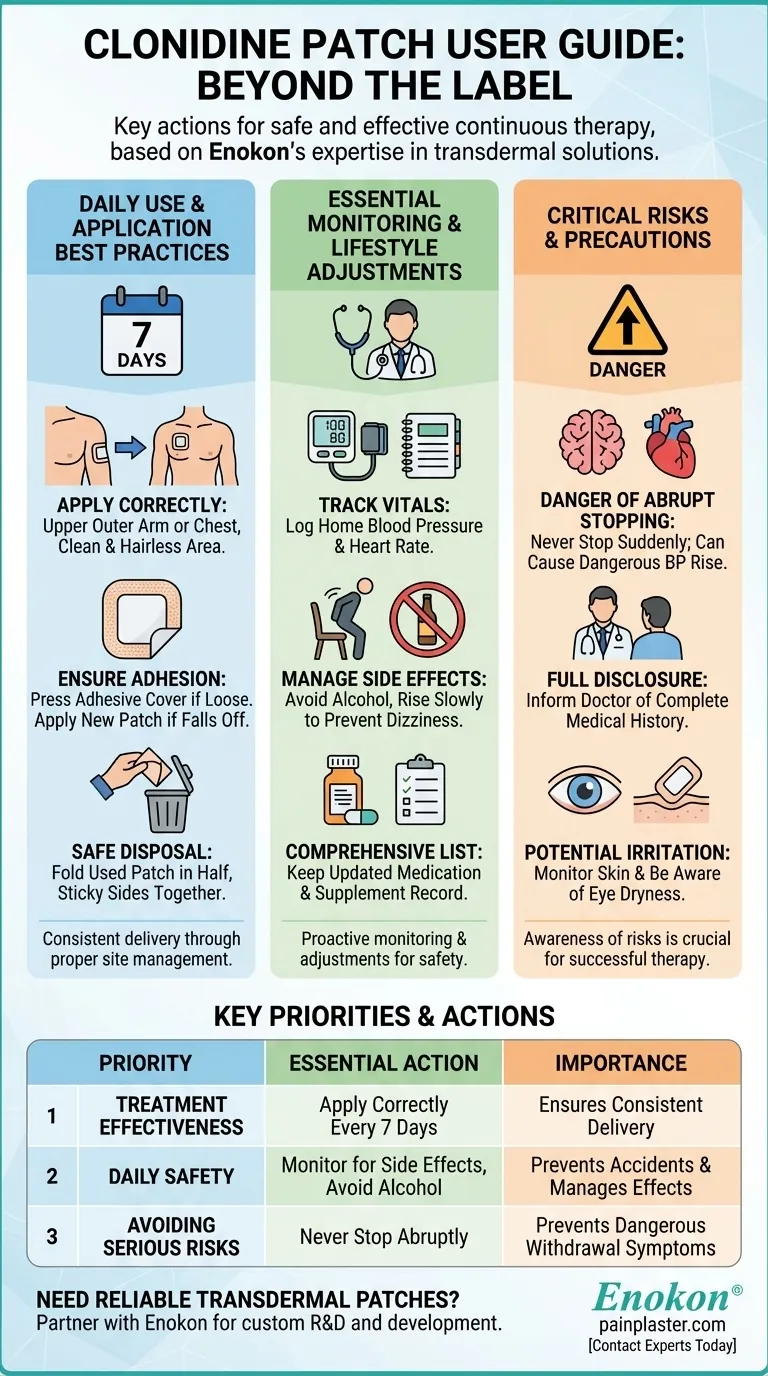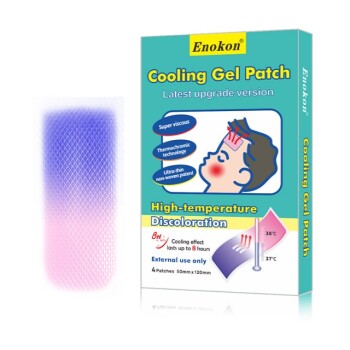Beyond the prescription label, successfully using a clonidine patch requires careful attention to daily routines, consistent monitoring, and a clear understanding of potential risks. Key actions include applying the patch correctly, tracking your blood pressure and pulse, being aware of side effects like drowsiness, and never stopping the medication abruptly without your doctor's guidance.
The clonidine patch is not just a medication; it's a continuous therapy system. Your role is to ensure its consistent delivery by managing the application site while actively partnering with your doctor to monitor its effects on your body and avoid the serious risks of sudden withdrawal.

Daily Use and Application Best Practices
Proper application and handling are the foundation of effective treatment. These steps ensure you receive a steady, correct dose over the seven-day period.
Applying the Patch Correctly
The patch should be applied once every seven days. Always choose a clean, dry, and hairless area of skin on the upper outer arm or chest.
Avoid applying the patch to skin that is irritated, scarred, cut, or calloused to ensure proper medication absorption.
Ensuring Proper Adhesion
If the patch edges begin to loosen, secure it by pressing the provided adhesive cover directly over the patch. This will help it remain in place for the full week.
If the patch falls off entirely before the seven days are up, discard it safely and apply a new patch to a different skin area immediately.
Safe Handling and Disposal
Used patches still contain active medication that can be harmful to others, especially children and pets.
After removing a patch, fold it in half with the sticky sides together before disposing of it. Always keep both used and unused patches out of the reach of children.
Essential Health Monitoring and Lifestyle Adjustments
Clonidine affects your entire system, not just your blood pressure. Proactive monitoring and minor lifestyle changes are critical for your safety.
Keeping All Doctor Appointments
Regular check-ins are non-negotiable. Your doctor needs to monitor your blood pressure and overall response to the medication to ensure the treatment is both safe and effective.
Tracking Your Vitals at Home
Your doctor may ask you to monitor your heart rate and blood pressure at home. Keep a log of these readings and bring it with you to your appointments.
Managing Drowsiness and Dizziness
Clonidine can cause drowsiness, dizziness, or a decrease in mental alertness. Avoid alcohol, as it can significantly worsen these side effects.
Be cautious when driving or operating machinery until you know how the medication affects you. To prevent dizziness, stand up slowly from a sitting or lying position.
Maintaining a Comprehensive Medication List
Keep an updated written list of all prescription medications, over-the-counter drugs, and supplements you are taking. Share this list with your doctor and keep it with you in case of an emergency.
Understanding the Critical Risks and Precautions
While effective, clonidine requires a high level of awareness regarding its potential risks and the importance of full medical transparency.
The Danger of Abruptly Stopping Therapy
Never stop using the patch suddenly without explicit instructions from your doctor. Doing so can cause a rapid, dangerous rise in blood pressure.
This withdrawal can lead to symptoms like nervousness, agitation, headache, and tremors. In rare but severe cases, it has been linked to hypertensive encephalopathy, stroke, and even death. Discontinuation must be done gradually over 2-4 days under medical supervision.
Full Medical Disclosure is Non-Negotiable
Before starting, inform your doctor of your complete medical history. This includes any allergies, history of heart or kidney disease, heart attack, or stroke. Also disclose if you are pregnant, breastfeeding, or over the age of 65.
Potential for Skin and Eye Irritation
Monitor the application site for any signs of a skin reaction. Additionally, clonidine can cause eye dryness, which may be particularly noticeable for those who wear contact lenses.
Key Priorities for Safe Clonidine Patch Use
Your approach to using the clonidine patch should align with your primary health goals and safety concerns.
- If your primary focus is treatment effectiveness: Adhere strictly to the seven-day application schedule and follow any dietary advice, such as a low-salt diet, from your doctor.
- If your primary focus is daily safety: Be vigilant about drowsiness, avoid alcohol completely, and take simple precautions like rising slowly to prevent dizziness and falls.
- If your primary focus is avoiding serious complications: Never let anyone else use your medication and commit to a gradual, doctor-supervised plan if you ever need to stop the therapy.
Your informed participation is the most critical factor in making this treatment a success.
Summary Table:
| Key Priority | Essential Action | Why It's Important |
|---|---|---|
| Treatment Effectiveness | Apply patch correctly every 7 days; follow dietary advice. | Ensures consistent medication delivery for blood pressure control. |
| Daily Safety | Monitor for drowsiness/dizziness; avoid alcohol; rise slowly. | Prevents accidents and manages common side effects. |
| Avoiding Serious Risks | Never stop abruptly; disclose full medical history. | Prevents dangerous withdrawal symptoms and complications. |
Need a Reliable Supplier for Transdermal Patches?
Partner with Enokon, a bulk manufacturer of reliable transdermal patches and pain plasters for healthcare and pharma distributors and brands. Benefit from our technical expertise for custom R&D and development to ensure your patients receive safe, consistent, and effective therapy.
Contact our experts today to discuss your manufacturing needs.
Visual Guide

Related Products
- Asthma Cough and Pain Relief Patch for Adults and Kids
- Far Infrared Deep Heat Relief Patches Medicated Pain Relief Patches
- Herbal Eye Protection Patch Eye Patch
- Mugwort Wormwood Pain Relief Patch for Neck Pain
- Icy Hot Menthol Medicine Pain Relief Patch
People Also Ask
- What role do natural ingredients and acupoint stimulation play in a cough relief patch? Synergistic Relief Explained
- How does the far infrared technology in the cough relief patch work? Enhance Natural Ingredient Delivery
- How does capsaicin work in the Reliever Patch? A Drug-Free Solution for Targeted Pain Relief
- Are pain relief patches safe for sensitive skin? Your Guide to Safe Use & Skin Testing
- What makes the cough relief patch a convenient option for managing coughs? A Mess-Free, On-the-Go Solution














